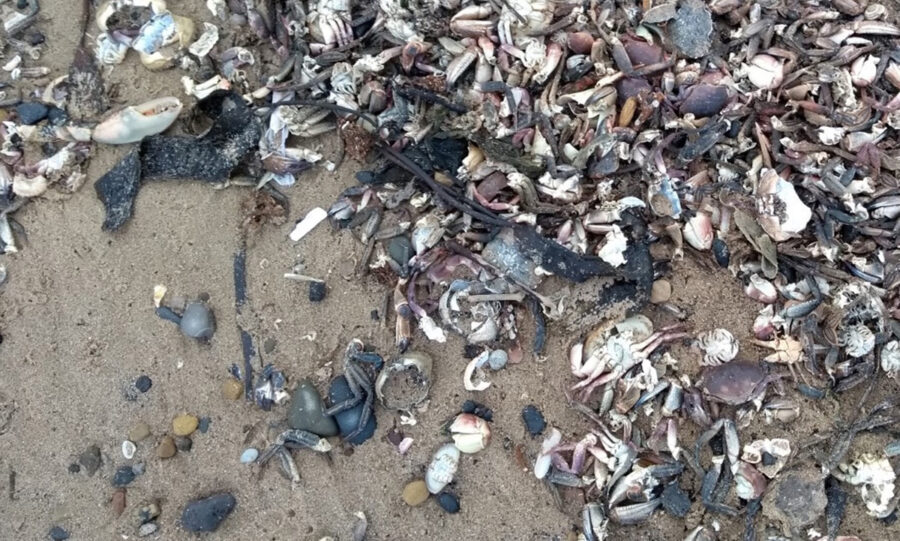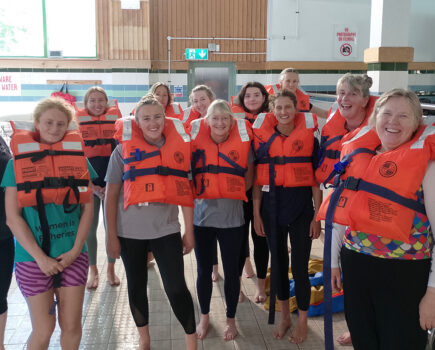Council supports inquiry with ‘powers to compel testimony’ and calls for financial compensation
North Yorkshire Council has called for a public inquiry into the mass die-off of shellfish off Teesside and the North Yorkshire coast that began in October 2021.
Fishermen in the region, represented by the North East Fishermen’s Collective (NEFC), blame the deaths on the large-scale dumping of chemically contaminated spoil from dredging in the river Tees connected to the development of the Tees Freeport – and say the problem is ongoing.
However, an inquiry by a panel of 12 independent scientists appointed by Defra that examined all the evidence collected by government agencies and York, Durham and Newcastle universities concluded that it was ‘about as likely as not that a pathogen new to UK waters – a potential disease or parasite – caused the unusual crab mortality’ (Fishing News, 23 February, ‘Outrage as Defra closes file on die-offs’).
Defra secretary Thérèse Coffey has ruled out any further inquiry into the deaths unless there is a recurrence.
Fishermen in the region welcomed the call for a public inquiry. James Cole, chair of Whitby Commercial Fishing Association and a member of the NEFC, told Fishing News: “We welcome anything that will keep this situation in the public eye.
“We’re all for a public inquiry because it’s still ongoing – it hasn’t gone away. We’re still getting starfish and inshore crabs washed up on Saltburn beach and other places.
“The crab job is pretty dire, all the way from Robin Hood’s Bay up to Hartlepool. There is no inshore spring fishery – you’re down from what used to be catches of 300kg to 400kg a day to just 40kg or 50kg. Crab catches are rubbish – lobsters are OK, but they are just catching them either dry ashore or out in deeper water.
“In the original die-off zone, it hasn’t got any better for crab, velvet crab, brown crab. You would expect to see it start to regenerate, but it’s not happening as quickly as you would hope after 20-odd months. It’s not looking good.”
North Yorkshire councillors failed to agree on a motion put forward by Labour and Lib Dem councillors, but supported an amended motion put forward by Conservative councillors. This avoided direct criticism of Defra, and took a more cautious approach than the original motion to the possibility that the die-offs could have been caused by dredging, according to the BBC Yorkshire and Local Democracy Reporting Service.
The wording of the agreed motion says the inquiry would have ‘powers to compel testimony and the release of all forms of evidence’ and calls on Thérèse Coffey to support the local economy and to ‘help in securing financial compensation for the fishing industry’.
Speaking at the meeting, North Yorkshire Independent councillor Michelle Donohue- Moncrieff said: “For those communities for whom this has gone on for such a long time, it’s not very good.
“They need answers and proper detailed research, and it’s in everyone’s interest to establish the facts.”
She added: “The most important thing is that communities know we haven’t forgotten them and that we are on their side.”
Labour councillor Neil Swannick, whose Whitby division has been affected by the die-offs and who put forward the original motion, said after the meeting: “I can’t think that anybody would not now understand that this is a big issue for fishing communities on the North East coast.
“The net result was that there will be pressure on the secretary of state to convene a public inquiry, which was the original aim of my motion.”
A spokesperson for the local Conservative Association said: “The amended motion enhances the original motion to not only call for a public inquiry in the manner they requested, but also called on the government to create fund and fund a dedicated taskforce to continually monitor the situation and compensate those affected.”
A Defra spokesperson said: “We understand that fishing communities in the North East wanted as thorough an assessment as possible into the crab and lobster deaths, which is why an independent panel of leading marine scientists was convened in late 2022 to provide an objective and full assessment of all available evidence about the causes of the mortality.
“The panel could not identify a clear cause for the unusual mortality, but suggested a novel pathogen as the most likely cause.
“The report includes a full assessment of the possible role of dredging, and concluded that maintenance dredging was ‘very unlikely’ to be the cause of the crab mortality, and capital dredging ‘exceptionally unlikely’ to be the cause.”
Defra said that whilst no further analysis of samples from the period from October 2021 through 2022 is planned, analytical work since the event began will enable further improvements to diagnosis of the cause of the deaths if a similar incident occurs in the future. “Environment Agency and government scientists at Cefas stand ready to respond,” said Defra.
On the council’s call for financial support for the local economy and compensation for the industry, Defra confirmed the position it set out in a letter from the environment secretary to Sir Robert Goodwill, chair of the Efra committee, dated 7 February: “We will not be providing compensation or specific support to fishermen impacted by the North East crustacean deaths.”
It said it had provided support through the Fisheries and Seafood Scheme (FaSS) and the UK Seafood Fund, which had seen £2.2m invested into the seafood sector in the North East since April 2021.
More than £260,000 has been awarded to a project led by the North Eastern IFCA to establish an ongoing survey programme for the inshore lobster fishery.
Fishermen awaiting results of latest testing
Fishermen in the affected region are waiting for the results of further testing of the sediments in the river Tees, coastal waters and samples of dead shellfish being carried out by the universities of Newcastle, York and Durham.
The testing is being funded with money raised by the North East Fishing Collective (NEFC) and with backing from The Fishmongers’ Company.
Initial tests by the universities cast doubt on the Defra theory that the deaths were caused by a toxic algal bloom, and their findings were taken into account by the inquiry panel set up by Defra towards the end of 2022.
Gary Caldwell, a senior lecturer in applied marine biology at Newcastle University, said he still believes the marine life deaths are linked to the development work on Teesside.
“We do think the deaths are linked to the release of pollution into the Tees as part of the development work taking place there. I think it’s tied into the freeport. We’re trying to trace it back,” he told The New European.
“It’s detective work. There’s pollution evident and we’re trying to trace it back to the source. Everything points towards a pollution source.
“Fisheries everywhere are suffering from contamination to some degree, but here in the North East the decline seems to be precipitous – it’s like someone’s flicked a switch.”
He said the die-offs are most likely to be the result of a combination of factors rather than dredging alone. He thinks excavations of highly contaminated ground on the banks of the Tees have released harmful materials that have then unknowingly been moved offshore by dredging.
He told The New European there is ‘a creeping spread’ of pollution along the coast, but to quantify the reach is a time-consuming and thankless task.
James Cole said the NEFC was waiting for the results of the latest tests, and had not had any confirmation of findings. “This is a hectic time of year at the universities with marking exam papers, but we’re being told that as soon as that’s out of the way, they’ll be cracking on with it,” he said.
This story was taken from the latest issue of Fishing News. For more up-to-date and in-depth reports on the UK and Irish commercial fishing sector, subscribe to Fishing News here or buy the latest single issue for just £3.30 here.
Sign up to Fishing News’ FREE e-newsletter here.








